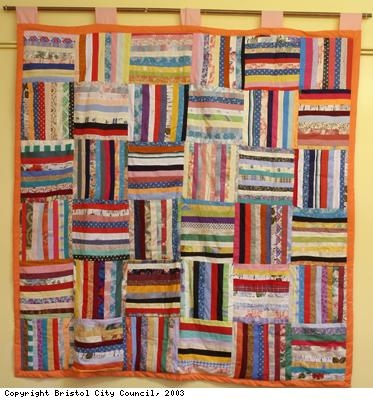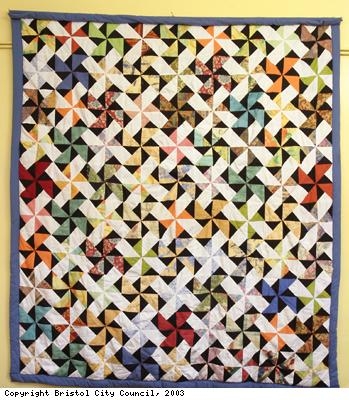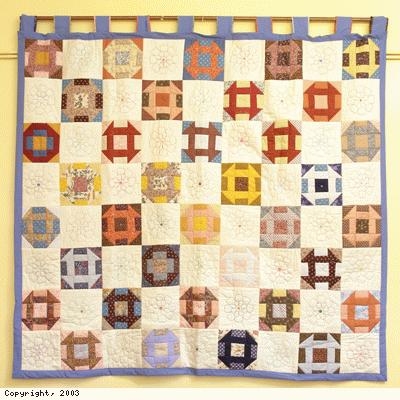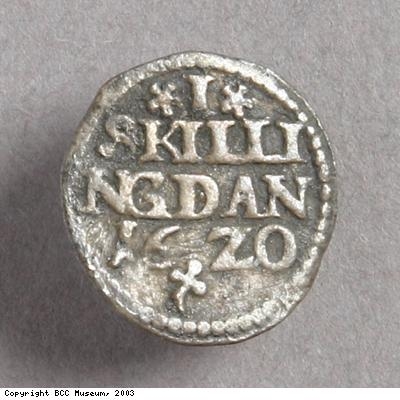Page 255 of 352 pages « First < 253 254 255 256 257 > Last »
Quilt

Description:
Quilt made by quilters by The Golden Agers Club, Easton, Bristol. This quilt uses an adaptation of a traditional American design called Rail Fence, which is named after wooden fencing. The quilt is made up of blocks (or squares) and each one has the Rail Fence design inside it. The blocks (or squares) are then placed together at different angles to make the overall quilt design.
Creator: Golden Agers Club
Date: 2002
Copyright: Copyright Golden Agers Club
Quilt

Description:
Quilt made by quilters at The Golden Agers Club, Easton, Bristol. This quilt uses an adaptation of a traditional American design called Windmill . The quilt is made up of blocks (or squares) and each one has large and small triangular shapes inside it, which look like the sails of a windmill. The blocks (or squares) are then placed together at different angles to make the overall quilt design.The quilter tries to contrast tone and pattern so that the design can be seen.
Creator: Golden Agers Club
Date: 1999
Copyright: Copyright Golden Agers Club
Quilt

Description:
Quilt made by quilters at The Golden Agers Club, Easton, Bristol. This quilt uses an adaptation of a traditional American design called Churned Ash, which is named after a traditional butter churn. The quilt is made up of blocks (or squares), some have the Churned Ash design inside them while others have a simple stitched flower design. This quilt was commissioned in 2003 by the Soundwell Centre at The City of Bristol College.
Creator: Golden Agers Club
Date: 2003
Copyright: Copyright Golden Agers Club
Object ID:DME0266
Coin from Denmark

Description:
1 skilling coin from Denmark during the reign of Christian IV, 1588 – 1648. Date on coin reads 1620. Found in Bristol Harbour. The Danes were trading in enslaved Africans from 1651.
Date: 1620
Copyright: Copyright BCC Museum
C-shaped Queen Manilla

Description:
C-shaped Queen Manilla , East Nigeria.
King and queen manillas were very large types of manilla, made in Africa for use as a form of wealth and in funeral ceremonies.
Manillas were brass bracelet-shaped objects used by Europeans in trade with West Africa, from about the 16th century to the 1930s. They were made in Europe, perhaps based on an African original. Once Bristol entered the African trade, manillas were made locally for export to West Africa.
Date: unknown
Copyright: Copyright BCC Museum
Object ID:Ea12434
King Manilla.

Description:
King and queen manillas were very large types of manilla, made in Africa for use as a form of wealth and in funeral ceremonies.
Manillas were brass bracelet-shaped objects used by Europeans in trade with West Africa, from about the 16th century to the 1930s. They were made in Europe, perhaps based on an African original. Once Bristol entered the African trade, manillas were made locally for export to West Africa.
Creator: Captain R P Wild
Date: unknown
Copyright: Copyright BCC Museum
Object ID:Ea8049
Manilla.

Description:
Manilla , East Nigeria.Manillas were brass bracelet-shaped objects used by Europeans in trade with West Africa, from about the 16th century to the 1930s. They were made in Europe, perhaps based on and African original.Once Bristol entered the African trade, manillas were made locally for export to West Africa.
Date: unknown
Copyright: Copyright BCC Museum
Object ID:Ea12446
Twisted Manilla.

Description:
Twisted manilla , East Nigeria.Manillas were brass bracelet-shaped objects used by Europeans in trade with West Africa, from about the 16th century to the 1930s. They were made in Europe, perhaps based on and African original.Once Bristol entered the African trade, manillas were made locally for export to West Africa.
Date: unknown
Copyright: Copyright BCC Museum
Object ID:Ea12347
Queen Manilla

Description:
King and queen manillas were very large types of manilla, made in Africa for use as a form of wealth and in funeral ceremonies.
Manillas were brass bracelet-shaped objects used by Europeans in trade with West Africa, from about the 16th century to the 1930s. They were made in Europe, perhaps based on an African original. Once Bristol entered the African trade, manillas were made locally for export to West Africa.
Date: unknown
Copyright: Copyright BCC Museum
Object ID:Ea12453
Page 255 of 352 pages « First < 253 254 255 256 257 > Last »


